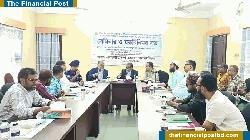Nepal is on the verge of appointing former Chief Justice Sushila Karki as interim Prime Minister, as the country reels from weeks of violent youth-led protests that forced the resignation of Prime Minister K.P. Sharma Oli.
A constitutional expert told Reuters on Friday that President Ramchandra Paudel and Army Chief Ashok Raj Sigdel have held consultations and are preparing to formalize Karki’s appointment. A decision could be announced following a meeting at the president’s residence later today. Neither the presidential office nor the military has commented publicly.
Mass protests erupted last month after the government briefly banned social media in an attempt to curb misinformation. Though the ban was quickly lifted, outrage spread among young Nepalis who accuse leaders of corruption, nepotism, and ignoring unemployment.
The demonstrations, led by so-called “Gen Z” activists, spiraled into violent clashes. At least 34 people were killed and more than 1,300 injured in Kathmandu and other cities. Government buildings were set ablaze, businesses were looted, and neighborhoods saw widespread arson and vandalism. The army imposed a curfew and deployed patrols to restore order.
Amid the unrest, Prime Minister Oli announced his resignation on Tuesday, bowing to public pressure.
Karki, who became Nepal’s first female Chief Justice in 2016, has a reputation for integrity and her tough stance against corruption. Protest leaders and young demonstrators have rallied around her, calling for a neutral figure outside party politics to guide the country through transition.
“She represents honesty and independence,” one protester told local media. “We don’t want the same corrupt politicians again.”
While there is consensus among protesters, questions remain over how her appointment fits within Nepal’s constitution. Some groups demand that parliament be dissolved, while others insist it must remain intact to preserve democratic order.
Analysts warn that even if appointed, Karki’s role will be fraught with challenges. She will be expected to calm the streets, pave the way for fresh elections, and win the cooperation of deeply divided political parties.
On Friday morning, signs of normalcy began returning to the capital. Shops reopened, and limited traffic returned to the streets. But army patrols continue, and restrictions remain in several neighborhoods. Schools and universities are still closed.
Nepal has faced repeated political turmoil since abolishing its monarchy in 2008 and transitioning to a republic. Governments have risen and fallen in quick succession, with corruption scandals, unemployment, and power struggles fueling instability.
Observers say Karki’s appointment could mark a turning point, signaling the influence of a younger generation demanding accountability. Yet, the success of her interim leadership will depend on whether the political establishment is willing to cooperate.
FP/Raj


 Journalists need financial protection: Press Council Chairman at Sreemangal
Journalists need financial protection: Press Council Chairman at Sreemangal
 Press Council workshop in Moulvibazar to prevent media misreporting
Press Council workshop in Moulvibazar to prevent media misreporting
 JUCSU Polls: Independent Abdur Rashid grabs VP, Shibir’s Mazhar bags GS
JUCSU Polls: Independent Abdur Rashid grabs VP, Shibir’s Mazhar bags GS
 ‘Suspected foreign agent’ sent to jail
‘Suspected foreign agent’ sent to jail
 US Tariff reduction possible if trade deficit narrows: Adviser
US Tariff reduction possible if trade deficit narrows: Adviser